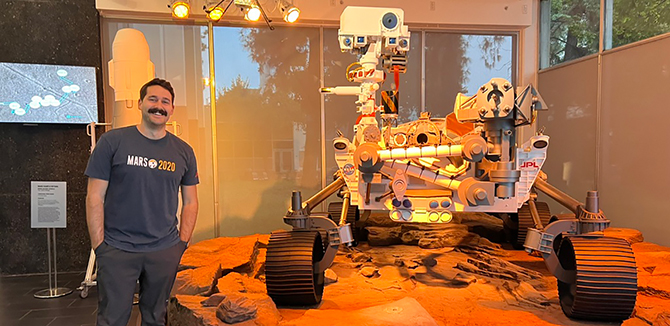Mission: Mars
Michael Fedell applies what he learned in the MSiA program to NASA’s goal of bringing humans to the red planet.

Michael Fedell (MSiA ‘19) spends his days dealing with data that is literally out of this world.
Fedell is a data scientist and cloud architect at NASA's Jet Propulsion Laboratory (JPL). His focus is creating applications that make information beamed back to Earth from the Mars Perseverance Rover more widely available to those responsible for helping NASA meet its goal of sending humans to the red planet sometime next decade.
To do his job well, Fedell leans on what he learned from Northwestern Engineering's Master of Science in Analytics (MSiA) program, now known as the Machine Learning and Data Science (MLDS) program.
“Extraplanetary geology is not my expertise,” Fedell said. “MSiA taught me how to work in a team of data scientists, identify people's skill sets and strengths and interests, and really leverage those through dividing up work.”
Today, Fedell works with a group of about 60 colleagues at JPL, 18 of them who similarly specialize in cloud innovation. The work involves filtering the valuable data from the X-ray spectroscopy instrument onboard the Perseverance Rover, which landed on Mars in February 2021, and ensuring those among the other 6,000 JPL employees who need it have access and can easily make sense of it.
NASA’s goal is to use that data and other information returning from Mars to develop technology to support a human-led mission to Earth's closest planetary neighbor sometime in the 2030s.
“I'm surrounded by these brilliant people, and they're building all of these really interesting things or discovering hidden insights and making use of science data that comes from other planets,” Fedell said. “I get to partner with these scientists and support them to get those insights in the hands of more people. It's always neat to see how excited they get with a little bit of cloud engineering that can multiply their productivity by ten.”
Fedell leans on his MSiA education daily in pursuit of his part of the mission. He said he was attracted to the program because of its well-earned reputation and the diversity of its cohorts, which feature representation from a variety of industries.
The program’s emphasis on finding projects that are not only of interest but that are financially feasible and support business goals has proven valuable to his work life.
His internship with JPL while he was a student also helped.
“It was a really rich internship experience, both in terms of technical development and in learning how to be an effective data scientist in the workplace,” he said. “I felt like Northwestern gave a really good, well-rounded set of skills and a big toolbox to work with, and I felt well-equipped to tackle a lot of the projects that were coming across my plate during the internship.”
That made returning to JPL as a full-time employee an easy decision, Fedell said. Since then, he has put his MSiA education to good use in pursuit of expanded horizons for humankind.
Fedell has also remained connected to the program. For several years he's served as a teaching assistant for its Cloud Engineering for Data Science course.
Fedell encourages others to follow in his footsteps. Most importantly, he recommends taking advantage of opportunities inside and outside the program.
“If you show up to all your classes, you do your assignments, you interact with your cohort and your professors, you'll take away a ton,” he said. “But I found that Northwestern has a whole lot to offer beyond that. There's all sorts of seminars and guest speakers and different clubs and things that you can investigate while you're there. Take advantage of that.”

